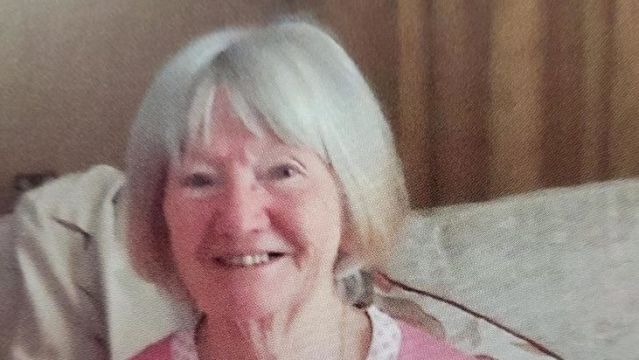An inquest has heard that a family took a Dublin woman home to die because of the poor treatment she was receiving in Beaumont Hospital, where medical staff did not believe she was terminally ill.
Monica Renwick (79), a mother of three and grandmother, died at her home at Grange Park Avenue, Raheny on October 23rd, 2020, a week after her family had discharged her from the hospital amid concern at her deteriorating condition while under the care of doctors at Beaumont during a two-month stay.
Her husband and children also complained about the poor hygiene, nutrition and pain management she received during her time in the hospital.
They claimed there was poor communication from staff at Beaumont with numerous calls going unanswered and many requests for updates on Ms Renwick’s condition getting no response.
The family also criticised the fact that she had been placed in a ward with some male patients, while they believed some staff members had turned her mobile phone off.
A sitting of Dublin District Coroner’s Court on Tuesday heard that Ms Renwick became unwell shortly after she had a procedure at Bon Secours Hospital in Glasnevin in August 2020 to remove a stoma that had been put in after she had been diagnosed with rectal cancer the previous year.
The deceased’s husband, Brendan Renwick, gave evidence that medical staff at Beaumont, where she was admitted after becoming unwell, had refused her family’s request to have her referred to a palliative care team because of her deteriorating health.
Mr Renwick, who said the couple would have celebrated their 60th wedding anniversary last year if his wife had lived, said his family had decided she would be better cared for at home because of the rapid weight loss, multiple skin tears and thrush she had developed in the hospital.
'Broken-hearted'
The inquest heard that Ms Renwick had expressed her own wish that she wanted to go home and knew she was dying.
Mr Renwick said he was “broken-hearted” at his wife’s death and expressed his belief that she would be still alive today if she had not had the procedure to remove the stoma.
“My life without Monica is not the same. I will never get over the loss of my dear wife,” he added.

In reply to questions from coroner, Aisling Gannon, Mr Renwick said he did not want to take his wife out of Beaumont but his family had come to the view that she would receive better care at home than in the hospital.
He claimed the Covid-19 pandemic at the time was not an excuse why his wife was not being fed and cleaned properly.
His older daughter, Geraldine Kenny, told the inquest that her mother’s stay in Beaumont came at an extremely difficult time with limited access to see her during the pandemic.
“I felt the care at Beaumont was not at an acceptable standard and there was a great deal of failings,” said Ms Kenny.
She said her mother, who had also survived breast cancer in 1974, had been declared cancer-free in March 2020.
However, Ms Kenny said her mother was in a lot of pain and discomfort after the removal of the stoma and criticised the absence of an after-care plan and follow-up appointments.
The witness said she was extremely shocked at her mother’s condition in Beaumont on August 19, 2020 when she was very weak and could hardly speak at a time when doctors felt she might have sepsis.
'Skeleton'
She claimed her mother was “a mere skeleton” by the following month with “skin sagging around her.”
Ms Kenny gave evidence that she found it very difficult to get information about her mother from the hospital including one day when only one of 23 calls she made to Beaumont was answered.
Ms Kenny said it appeared her mother had been left in soiled clothing, while it appeared she had suffered pressure sores because her pressure cushion had gone missing.
“I will never forgive myself for not insisting she was moved out of Beaumont a lot earlier,” she concluded.

Her sister, Angelina Kenny, said she was shocked to see her mother in the hospital on October 6th, 2020, when there were “obvious signs of neglect of basic hygiene needs” which she claimed was “unacceptable.”
Ms Kenny expressed wonder how hospital staff failed to realise her mother was terminally ill.
“A lay person would have known how sick my mother was,” said Ms Kenny.
A consultant specialising in colorectal surgery, John Burke – who was responsible for Ms Renwick’s care – told the inquest that she had received “extensive and involved” care from a multi-disciplinary team at Beaumont during her 61-day stay at the hospital.
Prof Burke acknowledged that it was undoubtedly a stressful time for the patient and her family but stressed that his medical team at Beaumont had done “its utmost” to keep them updated about her condition.
The consultant said complications with procedures to remove a stoma only occurred in about 5 per cent of cases and it was unusual for them to start over 10 days after surgery.
Despite treatment with antibiotics, Prof Burke said Ms Renwick had persistent intra-abdominal sepsis which he believed was the result of a delayed anastomotic leak following the procedure.
However, he highlighted that “progress was being made, albeit slowly.”
Asked by the coroner if what happened was utterly unexpected, Prof Burke replied: “Absolutely.”
Although Ms Renwick was reluctant to have corrective surgery which would require the reintroduction of a stoma, Prof Burke said she would have died without it.
He expressed doubt that a delay of around 48 hours in Ms Renwick agreeing to the procedure had any impact on the outcome and he had expected she would have made a full recovery.
Weight loss
Asked about the patient’s weight loss, Prof Burke said hospital records indicated that Ms Renwick’s body mass index had stayed within a normal 20-25 range during her stay in Beaumont.
He told the coroner that he was surprised to learn about the family’s complaint about the care provided to her at Beaumont but apologised for any failures by the hospital.
He said there was no intent or malice in any failings and highlighted how hospitals were trying to cope with the challenges posed by the Covid-19 pandemic.
Prof Burke also pointed out that mortality rates for elderly patients 90 days after such surgery was “in excess of 30 per cent.”
He also noted that Ms Renwick had been discharged from Beaumont by her family against the advice of hospital staff.
Questioned by the solicitor for Beaumont, Kevin Power, Prof Burke confirmed that the patients had refused nasogastric feeding and supplements at various stages which would have slowed her recovery.
The inquest heard that post-mortem results showed Ms Renwick died as a result of pneumonia and myocardial fibrosis.
Prof Burke said he accepted that a general decline in the patient’s health over a two-month period was a contributory factor but disagreed that it was linked to any abdominal surgery.
He assumed the pneumonia developed after her discharge from Beaumont as her X-rays at the hospital were clear of the infection.
A clinical nurse manager, Elizabeth Jose, said her ward had a policy of phoning the families of patients every day between 11am and 11.30am to provide updates on their condition.
She also insisted that Ms Renwick never had a pressure sore while in the hospital.
The inquest was adjourned until a future date still to be determined.







